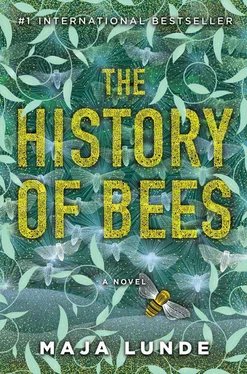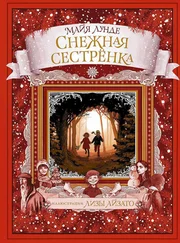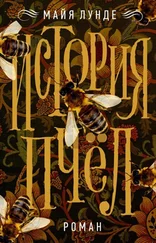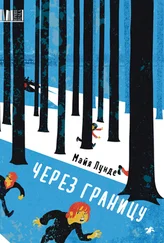“Honestly, Allison.”
“But George. Do you really need that much?”
I couldn’t bring myself to meet her green eyes from across the desk.
“The entire operation is down,” I said quietly to the floor.
“But…” She was quiet for a while, thinking. “Can’t we look at how we can get it up and running again without your needing to make such big investments?”
I had the urge to roar, but didn’t answer. She didn’t know shit about beekeeping.
“Where are the majority of your expenses, would you say?”
“Manpower, of course. I have two men working for me, you know that?”
“Yes.”
“And then there’s running costs. Feed. Gas, that kind of thing.”
“But now? Investments you must make?”
“New hives. We had to burn a lot.”
She chewed on a ballpoint pen.
“OK. And what does a hive cost?”
“Materials. Hard to say. They have to be built.”
“Built?”
“Yes. I build them from scratch. Every single one. Except for the queen excluder, that is.”
“The queen excluder?”
“Yes. The part that’s put between… Never mind.”
She took the pen out. Her teeth had left marks on the top. If she chewed harder, she’d crack the plastic, get ink on those white teeth of hers. That would be something. Blue ink on white teeth, on the freshly ironed blouse, on soft lips, like clumsy Halloween makeup.
“But…” She reconsidered. “I’ve seen Gareth Green have hives delivered. I mean, I’ve seen them arrive, on a truck. Ready to go.”
“That’s because Gareth orders them,” I said clearly, as if I were talking to a child.
“Is that more expensive than building them?”
She put the pen down. Apparently she wasn’t going to give me the pleasure of soiling her clean appearance.
The lump pushed its way upwards. Soon it would reach the point where it was no longer possible to hide it.
“I just mean,” she continued and revealed once again the white teeth, as if this were just so amusing, “that perhaps you can save some money by ordering them. And time. Time is money, too. Don’t build them yourself any longer.”
“I understood that,” I said quietly. “I understood that’s what you meant.”
When I finally managed to move again, it was completely dark. The street outside was quiet, with the exception of yelling from the tavern a little way down the street. A sad place, cramped and oppressive, where the village tosspots met night after night and drank themselves senseless. Some ran past, on the way out of there, shadows across the window, howling and singing, rude laughter, which became gradually fainter the further away they got.
I was cold. The room had grown chilly, the evening air flooded through the door, which I hadn’t gotten around to closing before falling asleep. My neck was stiff, my head had toppled towards my chest and my shirtfront was damp with saliva.
I stood up, stiff and sore, hurried to the door and quickly closed it.
Imagine if someone had discovered me, imagine if customers had looked in and seen me sleeping in the shop, right in the middle of opening hours. Even more stories could arise from such things, yet again I could put myself on the map as the village fool. But maybe, hopefully, the afternoon had been just as bloody quiet, or should I say as blessedly quiet, as the morning.
My stomach clamored for nourishment and wrapped in paper was a last piece of the pie. Dry and cold, the grease had congealed into a wormlike ridge around the edge. I ate it all the same and simultaneously swore I would never again allow myself be tempted into eating this dish. Perhaps not even pie at all. Although, what difference did it make?
I closed up, locked the door and set out for home.
The voices from the tavern grew louder.
The windows were warm yellow squares in the darkness. For the first time in my life, I felt drawn to them. A goblet of cheap wine, merely. It couldn’t do any harm. I stopped. If someone saw me in there, that I’d become one of them, would it really change anything?
Everything was as usual outside the tavern. The same scenes played themselves out this evening as on every other evening; two rough workmen were arguing loudly, one of them bumped into the other, shoved him, soon they would fight. A stout tramp gurgled to himself as he lurched down the street; at the same time a tall lout came staggering out the door, brushed against the corner and spewed twice where nobody could see, but the sounds of the day’s supper and the excessively large amounts of alcohol he had consumed, which found its way back out into the fresh air, were not to be mistaken.
No. I headed home. I had not sunk that low. When I passed the building, I noticed that even more people were outside on this bright summer evening.
A young girl’s vulgar squealing. “Stop it! Don’t!”
It was a no that said yes. Followed by intense giggling.
It was only now that I recognized the voice. It was Alberta. I didn’t even need to see her to know how her large breasts were most certainly on the verge of swelling out of her dress, I could literally feel the penetrating odor of the cleavage between them all the way here.
Somebody was pressing against her and digging with his hands at all of her curves, slurring drunken incoherence against her throat, absorbed in his own lust, own intoxication, own desire, pounding against this wind-fallen fruit, this rotting fruit, that would soon bulge into something unrecognizable, swell up, for nine whole months. A young boy, judging by his ungainly figure, perhaps no more than fifteen or sixteen years old, the voice still hoarse and fresh, recently changed. He was far younger than she was, should have been at home, in bed, sleeping or perhaps reading, studying, planning for the future, to make somebody proud, to make a name for himself. A door opened, the light fell through, disclosing with whom Alberta was having vertical intercourse, who the young figure was, who far too soon had commenced his own process of putrefaction, consumed by what he believed was passion, who at exactly this moment was in the process of putting his entire existence at risk, and who didn’t see me, see his father, his father who believed that life had long since hit rock bottom, but who at this moment truly had the rug pulled out from under his feet.
Edmund.
Icontinued along the subway track, passed several stations, but didn’t see any people, saw no sign of any kind of life. Mile after mile, still running, with lungs that burned and the taste of blood in my mouth. Every station I caught sight of awakened a hope. But every attempt to open a door, to come out onto the platform was the same slap in the face. Because they weren’t in operation. I was still in no-man’s-land.
I had no idea my legs could carry me this far, that I could push myself this hard. But now there was nothing left.
I sank down against the wall of a house. There was a tearing in my chest due to lack of oxygen. The darkness closed in around me, around the city, around what had once been a city. Directly across from me lay a collapsed building, destroyed beyond recognition, perhaps the last thing they’d done, those who’d moved away from here. As if they didn’t want there to be anything left. But everywhere there were traces of people. Old adverts posted, a broken bicycle, threadbare curtains bearing marks of the wind and weather behind a broken window, nameplates on entrance doors, some playful, handwritten, others formal and manufactured. Where were they now, all those who had lived their lives here?
I hadn’t thought about it before, but the rubbish had been removed. The bins were empty, lined up along the sidewalk, neatly in a row, down the whole street. Perhaps that was actually the last thing that had happened here. A garbage truck had rumbled through the deserted streets and cleaned up to prevent rats. Or perhaps to gather up the final remnants of nourishment, of organic waste that could be scavenged, scraped out and served again. Preferably as animal feed, or also for us, as food for humans, camouflaged, disguised, mixed into forcemeat and sausages, as canned food—with additives of all the different artificial components of flavors and chemicals that made our food edible.
Читать дальше









